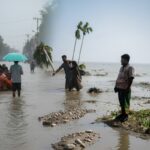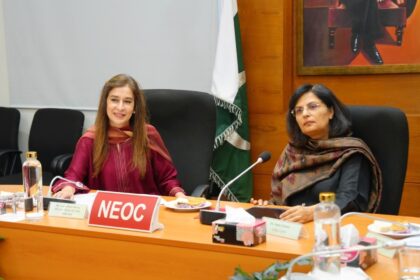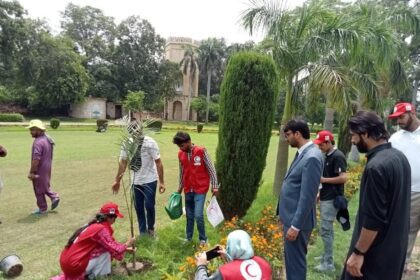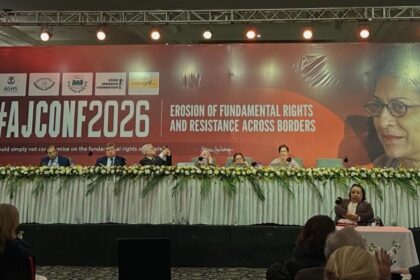Speakers at a seminar hosted by the Awami Workers Party at the National Press Club in Islamabad blamed recent floods on profit-driven development and neoliberal policies, not merely natural causes, and called for a unified “environmental politics” that prioritizes working-class needs, protects ecosystems and rejects debt-driven mega-projects. They urged democratic and progressive forces to unite against what they described as the dispossession of communities and environmental destruction by private interests and state-backed development.
The event drew students from twin cities and across Pakistan, progressive political activists, residents of informal settlements, intellectuals and ordinary citizens. Speakers included Bakhshal Thalho, Asim Sajjad, Baba Jan, Neelam Nagar, Zubair Torwali and Tuba Syed, who spoke about the scale of damage from the floods and the political and economic drivers behind them.
Panelists argued that the 2025 floods, like those in 2022, were aggravated by unchecked commercial activity and neoliberal development priorities. They singled out timber and real-estate mafias, hotel owners, mining companies and state-linked construction firms including the Frontier Works Organization, the National Logistics Cell and enterprises promoting “green tourism” for accelerating environmental degradation through unregulated construction and resource extraction. While acknowledging that climate change and rising temperatures are factors, they said state policies and private profiteering intensified the disaster’s impact.
Speakers rejected calls for large dam-building as the primary post-flood response. They warned that big water projects, including proposed dams, have historically contributed to extensive damage to the Indus delta, increased salinity, displacement of working-class communities and heavier external debt burdens. They cited the estimated cost of the Diamer-Bhasha dam—roughly 30 billion dollars—as an example of projects that deepen borrowing crises while imposing social and environmental costs.
The seminar also criticized political and intellectual elites for what was described as indifference or short-term politicking. According to speakers, the government has combined relief photo-ops with attempts to secure international climate funds, while maintaining a development model that favors elite profits. They accused elements of the “hybrid regime” of protecting vested interests and enabling state officials to profit by dispossessing workers of land, forests, minerals and water resources.
As an alternative, participants proposed an environmental politics that goes beyond conservation to center the economic and social needs of workers and marginalized communities. This program, they said, would challenge exploitation of underdeveloped regions, refuse conditional loans and external-imposed policies, and prioritize democratic control over natural resources. Speakers emphasized that such a platform represents Pakistan’s younger generations—some 160 million people under the age of 25—who will disproportionately face worsening environmental crises.
The seminar concluded with a call for all democratic and progressive forces to unite under a common economic and political program to halt environmental destruction, protect livelihoods and reshape development priorities away from profit-driven, elite-centered models.











